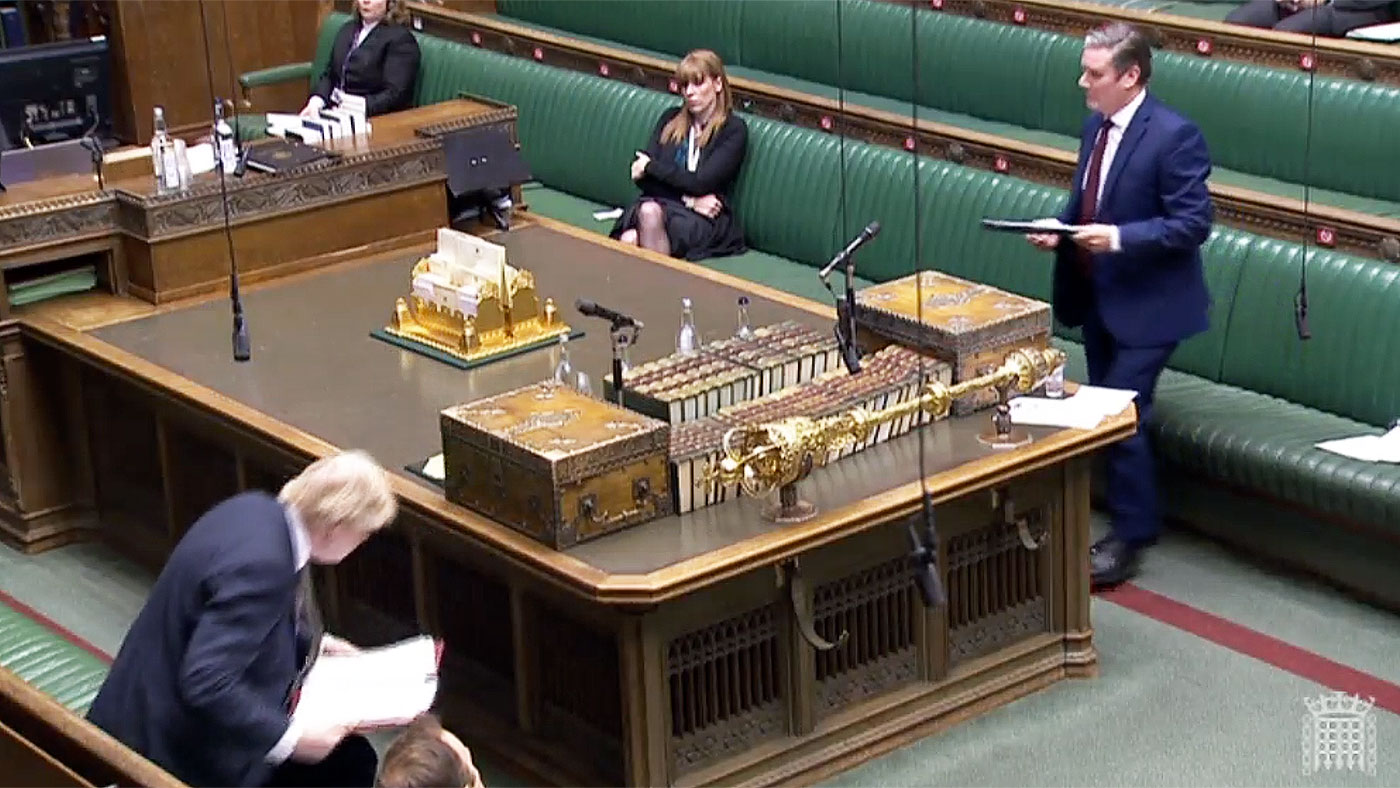How Keir Starmer can rein in Boris Johnson
New Labour leader gives PM pause for thought in their first Commons head-to-head

A free daily email with the biggest news stories of the day – and the best features from TheWeek.com
You are now subscribed
Your newsletter sign-up was successful
Keir Starmer has faced Boris Johnson at Prime Minister’s Questions for the first time, in an encounter delayed first by the prime minister’s hospitalisation with Covid-19 and then by the birth of his son.
Following the brief courtesy of congratulations, the new Labour leader went straight on the offensive. Indeed, in “the first meaningful PMQs of the decade”, we got a glimpse of why Conservative MPs “are getting nervous”, says Politico.
Even before this afternoon’s Commons clash, an unnamed Tory MP had told the news site: “We are in a completely different world now, in terms of the opposition as well as the virus. Starmer is a prosecuting lawyer, and it is going to be the case for the prosecution every week, with Boris as the accused.”
The Week
Escape your echo chamber. Get the facts behind the news, plus analysis from multiple perspectives.

Sign up for The Week's Free Newsletters
From our morning news briefing to a weekly Good News Newsletter, get the best of The Week delivered directly to your inbox.
From our morning news briefing to a weekly Good News Newsletter, get the best of The Week delivered directly to your inbox.
This prediction proved correct. Repeating his claim that “the UK was slow into lockdown, slow into testing, slow on tracing and slow on the supply of PPE”, Starmer pressed the PM to explain his past decisions, questioned his strategy for ending the lockdown, and cast doubt on government claims that coronavirus-related deaths are on the decline in care homes.
Delivering his verdict, ITV political editor Robert Peston tweeted that the Labour leader was the “right combination” of “both forensic and cautious”.
Starmer vs. Corbyn
Two previous PMQs performances against Johnson’s deputy, Dominic Raab, had put the Conservatives on notice that Starmer was more of a threat than his predecessor.
A free daily email with the biggest news stories of the day – and the best features from TheWeek.com
Whereas Jeremy Corbyn often “used crowdsourced questions and stuck to a script”, his successor has adopted “a more rigorous approach that focused on topics dominating the news agenda”, says the Financial Times.
That makes him “a more formidable opponent”, adds The Telegraph. Unlike Corbyn, Starmer “knows how to marshal his thoughts and to follow through on questions if he thinks there are flaws in the answers”.
Even former Conservative chancellor George Osborne agrees. The now-editor of the London Evening Standard tweeted: “Watching PMQs there’s one clear conclusion: after a 5 year absence, Britain has an opposition again.”
–––––––––––––––––––––––––––––––For a round-up of the most important stories from around the world - and a concise, refreshing and balanced take on the week’s news agenda - try The Week magazine. Start your trial subscription today –––––––––––––––––––––––––––––––
Starmer vs. Johnson
After winning the Labour leadership in the midst of a global pandemic, Starmer’s watchword has been “constructive”, says Patrick Macguire in the New Statesman.
To some, especially Corbyn’s supporters, that leaves Starmer looking “rather toothless”, but each of his questions to Raab last month “sought - and in most cases secured - an answer that ministers would rather not be public”.
Now, when facing Johnson, the contrast is even more stark. With most MPs dialling in from home, PMQs has been stripped of “the jeering and the aggro” that produced its “gladiatorial edge”, says Andrew Sparrow in The Guardian.
But “if Labour had to choose someone well suited to parliament in serious/boring mode, it is hard to imagine anyone better than Starmer”.
For Lloyd Evans in The Spectator, however, Starmer is “curiously lacking in the killer instinct”. Morally, the Labour chief’s reluctance to cast blame may be “heartening”, and his ability to deliver “an elegantly constructed question in three parts” is unrivalled, but “as a dramatic spectacle, it was like watching cress grow”.
Perhaps, but that may be no bad thing, says Jonathan Lis in Prospect magazine.
“The people elected a comedian when they wanted to be cheered up,” he concludes. “Now they just want to survive.”
Holden Frith is The Week’s digital director. He also makes regular appearances on “The Week Unwrapped”, speaking about subjects as diverse as vaccine development and bionic bomb-sniffing locusts. He joined The Week in 2013, spending five years editing the magazine’s website. Before that, he was deputy digital editor at The Sunday Times. He has also been TheTimes.co.uk’s technology editor and the launch editor of Wired magazine’s UK website. Holden has worked in journalism for nearly two decades, having started his professional career while completing an English literature degree at Cambridge University. He followed that with a master’s degree in journalism from Northwestern University in Chicago. A keen photographer, he also writes travel features whenever he gets the chance.